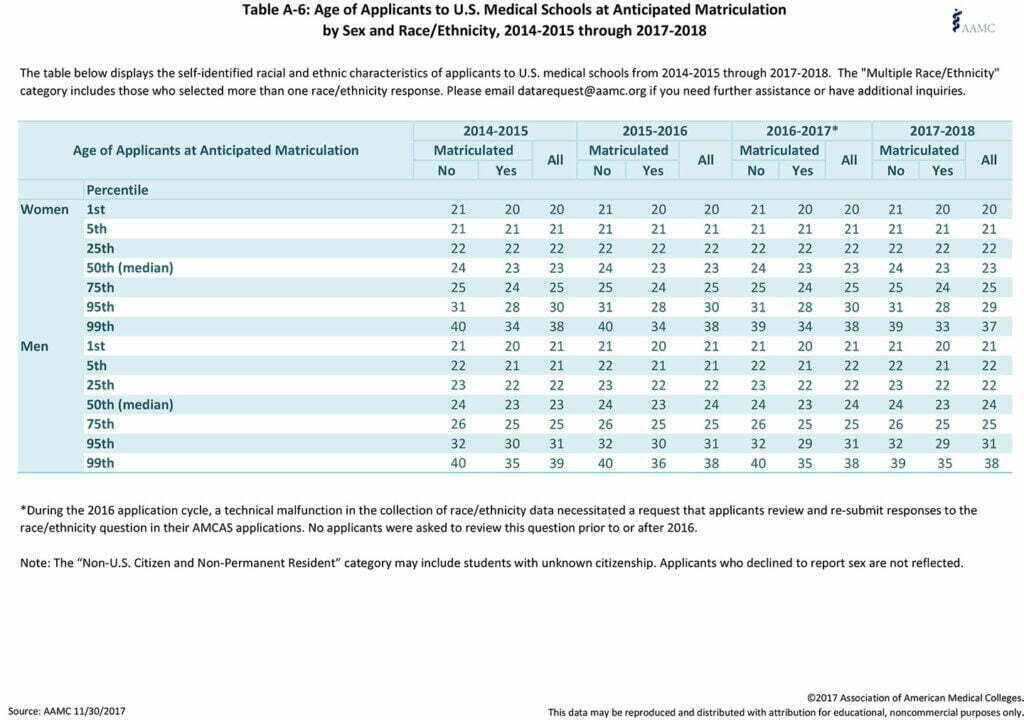The information on this website should not be considered medical advice.
This website contains affiliate links, and we may be compensated for referrals.
With the warm weather and summer months approaching, tens of thousands of students are preparing their medical school applications for submission. Many of them are concerned with questions such as ‘Is my MCAT score high enough?’, or ‘Do I have enough volunteering hours?’, but one subset of students, in particular, have been asking themselves ‘Is it too late to become a doctor?’.
Are You Too Old for Medical School?
Feeling like you’re too old to apply to medical school? Don’t let your age stop you from chasing your dreams.
According to the American Association of Medical Colleges (AAMC), nearly 1.1 million applications were submitted by just over 62,000 students in the 2021 application cycle. Of these applicants, 22,666 were admitted and matriculated into a program with 25% of these students over the age of 24 and 5% over the age of 30. Keeping this in mind, students might find themselves considering the logistics of pursuing their dream career in medicine.
Challenges as a Non-traditional Student?
Ask any pre-med student what the most difficult part of applying to medical school was, and they will generally be quick to say that putting together all components of the application was exhausting. Students will need excellent grades, a competitive MCAT score, volunteering hours, clinical observation hours, and strong extracurricular activities.
As a non-traditional student, putting these application materials together can be even more challenging because, well… life happens. Most non-traditional students will have found a job and some will have found significant others, bought homes, had children, and in general, acquired more responsibilities than their traditional counterparts. These life events should by no means prevent students from applying, but they do consume a nonzero portion of the time, energy, and funds that could otherwise be put toward their application.
With all this said, it may seem like applying later in life as a non-traditional student is ripe with disadvantages… I would argue that this is not entirely true.
Advantages to Starting Later in Life?
While it may not be intuitive, there are many ways that applying as a non-traditional student could be advantageous to your application.
First, non-traditional students have gained life experience! Maybe they have gone back to school and finished a degree, completed a post-bachelor’s program, worked in their industry, or found ways to employ themselves. Regardless, these applicants have been learning in some form or another. This can be a great advantage when interview season rolls around… this experience and maturity can show through with how a student carries and articulates themselves in a professional setting.
Second, if a student is working towards applying, they have been assembling materials while balancing work, school, family, and more. This shows excellent time and priority management, and commitment to their pursuits. When students can demonstrate their dedication to medicine and all of their other responsibilities, it shows that they will be able to balance the rigors of a medical program in addition to day-to-day and extracurricular activities. These are the students that schools want to admit — the ones that will finish their program and become physicians.
Finally, some schools look more favorably on non-traditional applicants. Believe it or not, these applicants are bringing value to the diversity and leadership that they have within their programs. When bringing the above skills and experience to the table, non-traditional students can be selective in where they send out their applications to maximize their odds of admission.
What about a longer-term residency program, like surgery?
Non-traditional students will find that the challenges they faced in medical school change a bit during residency. While they may be sacrificing additional time prior to starting their practice and losing more sleep, there are some upsides.
Residents receive a stipend during their residency, so rather than taking out loans, they will be bringing home a paycheck. This has major advantages for families that may have been undertaking a financial burden to support their families’ future doctor.
Additionally, non-traditional students will be pursuing jobs in hospitals or private practice once they finish their residencies, and the same experiences and maturity that make them the leaders of their medical school class will translate to their careers in practice. These residents will interview at a high level, relate well with their future employers and mentors, and serve as mentors themselves to their peers.
‘Is it too late to become a doctor?’…
They should remember the strengths that they bring to the table, and rather than shy away from the fact that they are non-traditional, embrace it. The admissions committee will NOT reject an applicant solely based on their age.
This means that students should tell their story in a way that frames how their maturity, life experience, and resilience will make them an outstanding student and future provider. Ultimately, regardless of age, this is the only thing that each admitted student must demonstrate.
If working in this field is truly a student’s dream, they shouldn’t let their fleeting youth deter them from pursuing it.





Facebook Comments